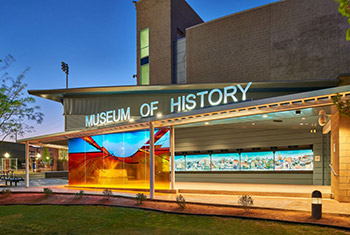 The El Paso Museum of History (EPMH) is one of three city-operated museums along with the El Paso Museum of Art and the El Paso Museum of Archaeology. EPMH was established in 1974 as the Cavalry Museum, but quickly served a scope and purpose beyond its title and began to serve as a local and regional history museum. The name of the museum was officially changed to the El Paso Museum of History in 1980.
The El Paso Museum of History (EPMH) is one of three city-operated museums along with the El Paso Museum of Art and the El Paso Museum of Archaeology. EPMH was established in 1974 as the Cavalry Museum, but quickly served a scope and purpose beyond its title and began to serve as a local and regional history museum. The name of the museum was officially changed to the El Paso Museum of History in 1980.
In 2000, El Paso citizens were eager to explore and display El Paso’s role in Texas history. That year El Paso voters passed a bond election approving $6.5 million in funding for the construction of a new two-story 44,000 sq. ft. history museum located in El Paso’s downtown Cultural Arts District. The City inaugurated the new museum on June 16, 2007.
The El Paso Museum of History serves the largest continuous border metroplex in North America—El Paso, Texas and Ciudad Juárez, Chihuahua—with a combined population of close to three million people.
Our Mission
The El Paso Museum of History (EPMH) offers excellent educational benefits to the community. EPMH introduces visitors to the significance of the rich multicultural and multinational history of the border region known as El Paso del Norte (The Pass of the North). Through exhibitions and educational programming, EPMH involves diverse audiences in exploring the varieties of human experience and encourages individuals to explore the past by reflecting on their own place in history.
Land Acknowledgement
We acknowledge our presence on Indigenous land. We honor and recognize all Indigenous people with early ties to the immediate and surrounding region:Lipan Apache, Mescalero Apache, Piro, Manso, Suma, Jumano, Ysleta del Sur Pueblo, Piro/Manso Tiwa Indian Tribe of the Pueblo of San Juan de Guadalupe, and Tortugas Pueblo.
We respect the nations, culture, history, and stories whose territories include present day Texas: the Carrizo & Comecrudo, Coahuiltecan, Caddo, Kickapoo and the peoples of Chihuahua and northern Mexico from which members of our community descend.
We are aware of our long-standing relationship with Indigenous land/people and we openly seek guidance to further understand Indigenous history and traditions. We understand the importance of growth within our community and encourage all members of the city to cultivate encouraging and meaningful discourse. We believe in building strong and mutually fulfilling relationships with all members of the community.





